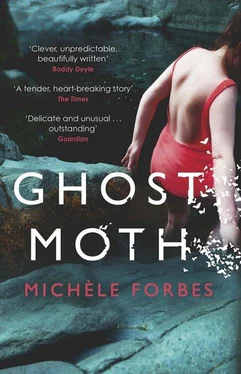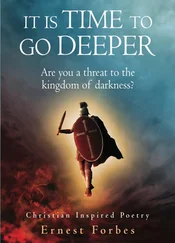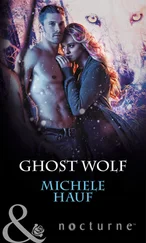
The sun, like a huge copper penny, had suddenly dropped out of the cloudless evening sky and was gone. Blocks of purple shadow were cast by the surrounding terraces onto the courtyard of the hotel. Fireflies flitted orange-red across the blue stones. The night grew quickly cold.
George had turned away from Katherine and, having made his way hurriedly down the wooden staircase and out through the back door of the hotel, now sat on the edge of the dry stone trough in the middle of the courtyard. As she approached him, he was a still, dark shape, his head bent low, his hands splayed on his thighs. His anger hung around him like a hungry dog.
They remained silent. She stood there, dressed only in her cotton nightdress and still barefoot, the stones giving back the daytime heat beneath her feet. Her arms and legs shivered slightly in the slim evening breeze. She stood there, not knowing what to say nor how to go about repairing the hurt she knew she had caused George. Why had she told him? Why had she been so foolish? Would she ever be exonerated in his eyes?
After a few moments, George released a small sound, something like a groan, only thinner and tighter, as though acknowledging a point of no return. When he finally spoke, his voice was measured and low.
“I found him, Katherine.” George’s head remained bent.
“What, George?” Her voice was a tremor.
George talked slowly, deliberately, as though he was spelling out every word to her. “Your tailor. . your lover. . whatever you want to call him. . I was the one who found him.”
“What?” Katherine spoke as though in a trance. “What do you mean, George?” A keen breeze ruffled the hem of her cotton nightdress.
George lifted his head suddenly, his eyes, black pools, glaring out into the night. “For God’s sake, Katherine—” A dark breathlessness was creeping into his voice. “I knew exactly who he was. I knew — you and he — had been — I had seen you both the night I waited for you — I had seen you from your mother’s parlor window — the night I asked you to marry me”—he dug the heels of his palms into his thighs as though in pain and squeezed his eyes tight momentarily as though he was trying to block something out—“and then I saw you two in town together — walking — and the way he placed his arm around you — I knew — I just knew.” He widened his eyes briefly, struggling to retain composure. “And people talk, Katherine. You know. People talk.” The darkness of his eyes intensified. He took in an enormous breath. “And then when I saw him kissing you that night — backstage — that night of Carmen — I had come to tell you I had been called on duty that night, but when I saw — I couldn’t bear it — I couldn’t bear to be anywhere near — so instead of talking to you, I wrote you a letter and I left — I wanted to deny the whole thing was happening — I thought that I would die — I couldn’t bear it Katherine — I couldn’t bear it.”
“You knew?” asked Katherine.
“For years it feels I have been waiting for you to come back to me.” He lifted his head to the night sky. “You were lost to me, Katherine — my fiancé—a ghost of a woman.” He gasped between tears. “All I longed for was that he would not matter to you anymore — that you would love me with the same passion that you loved him — that you would throw your arms around me finally as though I meant something to you.” He cupped his head in his hands and through his fingers she heard him say, “I didn’t mean to — Katherine — oh God, Katherine, I didn’t mean to.”
“What are you talking about, George?”
George let his hands fall from his face. When he spoke, his voice seemed hollow, and his eyes were wide and needy. “That night a call came in — someone had seen a man fall into the river beyond the foundry. We spread out on both sides of the bank — the swell so bad, the current so strong, the water so cold that none of us expected to find anyone alive — the rain and wind making it almost impossible to see anything”—George swallowed hard—“and I had moved upriver, away from the others, away from the foundry — I don’t know why — some reason — instinct — perhaps — coincidence — and just beyond where the bank broadens at the distillery — tucked away in under a clump of reeds”—George struggles to keep talking—“caught on a bolt from an old metal girder lodged in the riverbed — there he was — the collar of his jacket hooked onto the bolt — his head only half submerged”—George stared into nothingness as he recounted the events to Katherine—“he was breathing — he was still alive.”
Katherine spoke with a quiet exactitude, her body shivering with the increasing night. “They said that he was dead when they pulled him from the water.”
“Yes, he was.”
“But you’re saying he was still alive when you found him.”
“Yes.”
“I don’t understand.”
For the first time since he had spoken, George turned his head to look at her with a helpless despair. Then tears began to choke him. “I did nothing, Katherine, I did nothing. I just watched him.”
Katherine stood motionless. Then in a small, broken, voice she said, “You let him die?”
George said nothing.
“You let him die!” she repeated in disbelief.
George looked at her, this time pleading for succor, asking for forgiveness with the eyes of a ruined man.
“Katherine,” he said softly amid his tears. “Oh Katherine.”
A lizard scuttled out from behind the dry stone trough at their feet and disappeared soundlessly across the courtyard. Fireflies darted once again in the gloom, illuminating only their own infinitesimal world. The swollen moon was hanging above them as though from a silver hinge.
They checked out of their hotel in the cool of the early morning. They had not slept. Left behind on the squat cabinet beside their bed were the sombreros they had bought only two days before. By the time they climbed aboard their bus in the plaza, the sun was burning the world. Their long journey back to Nogales was wordless. The intense heat this time made them feel solid and heavy. Once again, the bus rattled along the roads of orange-brown dust, the tall trees on either side offering little shade. As they left the town, the endless fields of sugarcane spread out before them, taller than the tallest man, soft green and yellow-streaked, their tips falling backward, as though they were fainting from the heat. Hedges of organ-pipe cacti with gnarled, robust skins hemmed the outlying villages, threatening the volcanic orchards and cutting the cruel blue of the sky. The fields gave way to vast plains of arid scrubland, where a lone farmer walked a desolate cow, a rope looped around its horns. The bare mountains loomed oppressively in the distance, the same mountains that, on their journey in, had elated them.
When they disembarked at the border, the street seller who had taken their photograph approached them once again. Seeing that they had no sombreros, he tried to sell them more, holding his arms open to them, smiling at them with a wide, handsome grin. But they had walked past him without a word, their faces somber, their heads bent. Alone, together.
Their new life in America didn’t happen. As it turned out, Aunt Mildred’s connections were not as solid as she had led George to believe, and the jobs were not as plentiful in Phoenix as her letters had suggested. Their savings were disappearing week by week and the hope of creating a new life for themselves in America became more and more of a distant dream. George applied for whatever jobs came up. He wasn’t choosy, taking work for a time as a school janitor until he could secure something with better prospects, but he didn’t find anything. Even the state Fire Department had little to offer him. After four months, they made the decision to return to Belfast. They departed Phoenix on a balmy summer evening, the air heavy with the scent of orange blossom, and boarded the train back to New York, their hearts filled with a mixture of defeat and relief.
Читать дальше













